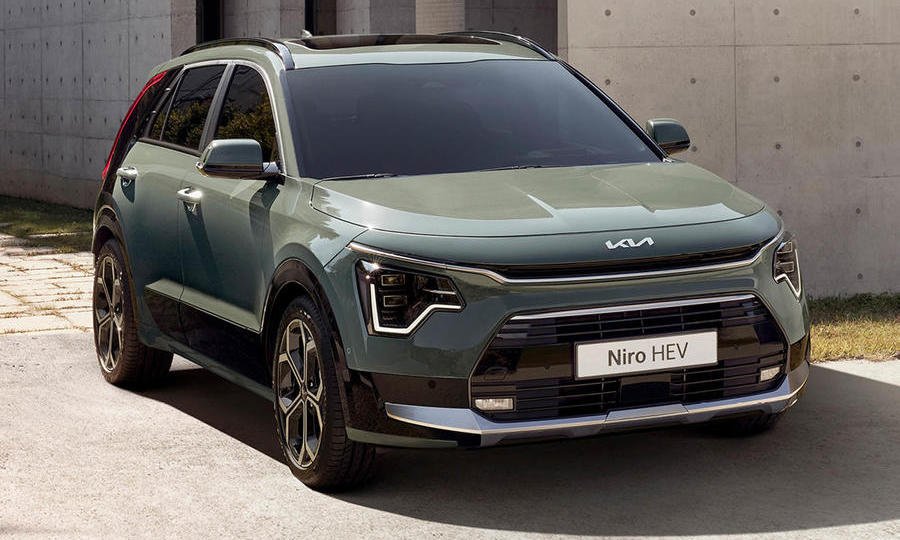New 2022 Kia Niro: fresh details on all-electrified crossover

New details of the second-generation Kia Niro have been revealed ahead of the crossover's market launch in the coming months.
The reinvented Nissan Qashqai rival was revealed late last year, but only limited details of its technical specifications and equipment were shared at the time.
Now, as it prepares to launch the model in Korea, Kia has confirmed that the new Niro is slightly larger than its predecessor, measuring 4420mm long, 1825mm wide and 1545mm tall – increases of 65mm, 20mm and 10mm respectively.
Alongside the resultant increase in cabin room, the battery has been moved out of the boot cavity to sit alongside the traction battery under the rear seats, increasing boot capacity by 15 litres to 451 litres.
The Niro will be launched with hybrid, plug-in hybrid (PHEV) and battery-electric powertrains, but Kia has so far only detailed the hybrid, which will use the same system as the outgoing car.
A 1.6-litre turbocharged four-cylinder petrol engine, producing 104bhp and 106lb ft, is paired with a 43bhp electric motor for a combined output of 139bhp. The model retains its six-speed dual-clutch automatic gearbox, but Kia said it has been "carefully engineered and optimised to increase efficiency and reduce weight".
Kia claims the new Niro Hybrid is capable of 59.1mpg on the Korean test cycle.
It has also detailed a new feature whereby the hybrid and PHEV will use data from the sat-nav system to switch between petrol and electric power where appropriate – shutting the engine down outside schools, for example.
The new e-Niro will remain separate from the firm’s line of EV-badged bespoke electric cars and won't use the E-GMP platform reserved for those models.
An evolution of the current e-Niro’s single-motor, front-wheel-drive powertrain is expected, although the shorter-range car could be discontinued in light of higher demand for the 282-mile 64kWh battery option.
Other modifications for the Mk2 Niro include a revamped suspension set-up claimed to improve responsiveness and stability, reconfigured steering for improved steering feel and enhanced sound deadening throughout the car's structure.
The new Niro takes heavy inspiration from 2019’s quirky HabaNiro concept, adopting a striking two-tone paint scheme, rugged 4x4-inspired design cues and a new version of Kia’s trademark ‘tiger face’ grille. A defining aspect is the chunky C-pillar, which is said to improve aerodynamics, and incorporates boomerang-shaped rear light clusters similar to those which adorn sibling brand Hyundai’s new Bayon crossover.
A focus on aerodynamics – Kia claims a drag coefficient of 0.29Cd – is part of a wider effort to improve the Niro’s efficiency and sustainability credentials. The new-look cabin is finished predominantly with recycled materials – the headlining uses recycled wallpaper and the seats incorporate fibres from eucalyptus leaves, for example – and the door panels are coated in a water-based paint free from BTX petrochemicals.
The influence of Kia’s newer models is evident in the asymmetrical centre console and dashboard. Significant changes over the previous car include an electronic gearshift dial, ambient mood lighting and slim, lightweight front seat designs with a coat hanger on the back of the headrests.
The Niro adopts a 10.25in one-piece screen for the infotainment and gauge cluster, which Kia claims "has been designed to be easy to use with pin sharp graphics and a highly intuitive layout". A minimalist climate control stack with light-up haptic buttons is positioned below, while the centre console hosts a rotary gear selector, wireless smartphone charger and other key controls.
A 10.0in head-up display, voice control function, electronic boot lid and remote park assist function are also equipped, but Kia has not confirmed whether these will be standard across the range.
Kia is expected to offer a timeframe and pricing for the new Niro's UK launch in the coming months.
Related News
